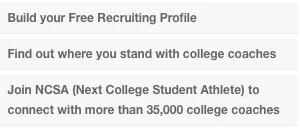High School Athletics
Athletic Professionalism at High School Level Could be Affecting Athletes’ Academics Standards
National Association of State Boards of Education
More Scrutiny of High School Athletics Needed to Ensure Academics a Priority, say State Eduction Leaders
The world at high school athletics has changed over the last several decades. Coaches, athletic directors, and parents have a moral obligation when it comes to protecting high school athletes and promoting better academics and education.
High school sports are regulated by each state by the state’s board of education. Each state is responsible for developing and monitoring accountability measures used to ensure that high school athletes are receiving academic training, and not only training in athletics. Organized sports continue to play a beneficial role in the lives of children and teens, but one key problem is that over the last decade, a lot of pressure has been placed on high school athletes. Another vital problem is that many coaches have placed too little emphasis on the academics of these athletes. One key issue that is now being investigated is the exploitation placed on high school athletes by college and professional recruiters.
The National Association of State Boards of Education (NASBE) is now intervening and stating that states must begin playing a larger role in promoting the primacy of academics in high school athletics. In addition to this, NASBE has outlined the importance of full student participation in sports, school-supervised performance-enhancing drugs testing and much more. The theory this board is taking is that school athletics is a privilege that students must earn.
Issues High School Athletes Face
· Single Sports. Many coaches are promoting students to play only one sport, even if the student shows interest in others. In addition to this, coaches at the high school level are discriminating against athletes that do not demonstrate an athletic level that is suitable for them.
· Success. In many cases, high school students are being pressured to meet academic requirements by cheating. In most schools, there are rules regarding a student’s grades and his eligibility for playing sports. To take this issue one step further, coaches may push students to get good grades in ways that are not right just to help the athlete receive a scholarship. This issue demoralizes students.
· Time. A high school sport may require year-round training, in some cases. This often leaves students feeling overwhelmed and unable to complete all of their necessary duties, including school work. This often takes the fun out of the sport and replaces it with unnecessary pressures.
Effects
These are just a few of the issues high school athletes may face. When a student is faced with these issues, other effects may follow. One common problem facing many highly pressured high school athletes is the use of performance-enhancement drugs, such as steroids. If an athlete is continuously pushed to do better, he may feel like using these drugs is his only way to improve. These effects are a slippery slope for many kids.
Changes
Several changes have taken place in the world of high school athletics. One change is to allow schools to perform drug testing on students. This change is designed to punish athletes who are using these drugs. Students who test positive may be removed from a team for a specified period or for the entire season.
Another change, made by the NCAA, is that colleges may add up to $2,000 extra to scholarships, above the cost of the education, rooming and board, etc. This extra amount is designed to help athletes that are underprivileged have the money they need for survival while attending a college and playing a college sport. The NCAA has also begun initiating changes regarding recruiting, the dates recruiting begins, and the requirements and limitations of high school athletic recruiting.
Baton Rouge Community College Sports Recruiting.


